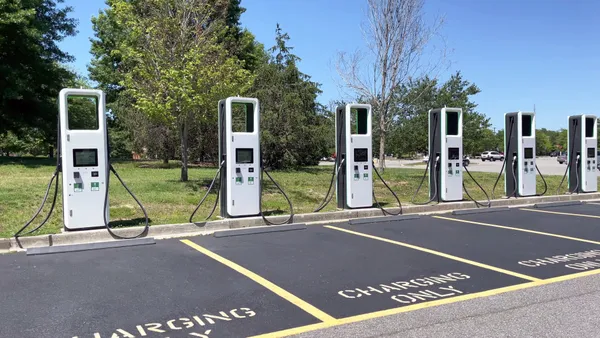Even as federal and many state policies support the transition to electric vehicles, more than half the states in the country impose special registration fees for plug-in EVs that range from $50 annually in Colorado to $225 in Washington, according to a July report from RMI, an independent nonprofit focused on clean energy.
The organization concluded that department of motor vehicle fees could be structured more strategically to reduce the number of vehicles registered in transit-rich areas, incentivize EVs over more traditional vehicles and put the revenue toward public transit, micromobility or active transportation improvements.
“Many of these states that impose additional fees at the same time have subsidies and incentives in place for EVs, so you have two policies … that are actively working at cross purposes with one another,” said report co-author Rushad Nanavatty, managing director of RMI’s urban transformation program.
California, which aims to eliminate sales of new gasoline-powered vehicles by 2035, charges an annual registration fee of up to $175 for EVs. Alabama, Arkansas, Ohio and Wyoming all charge special fees for plug-in or hybrid electric vehicles starting at $200.
One reason for these additional fees is that EV owners don’t buy gasoline and therefore don’t pay the fuel taxes that support the federal Highway Trust Fund and many state road budgets. “States saw that there was a trend for electric vehicles who will not show [up at] the pump and, therefore, will not pay a dime,” said Bobby Bui, an attorney and oil industry expert at Thomson Reuters.
The RMI report looked at what might happen if registration fees favored EVs in the nation’s 22 most populous cities. Modeling suggested that such fees could increase electric vehicle adoption in those cities by 39%. The model took into account the quality of transit service in a given city when assessing where car owners would be likely to forgo their vehicles.
The only example of an EV-friendly fee program in the U.S. that Nanavatty could cite is in the nation’s capital, where registration fees will be based on vehicle weight starting this fall. It’s a move to discourage the purchase of large, heavy SUVs and pickup trucks that do more damage to roadways and emit greenhouse gases at a higher rate. But electric vehicle owners will get to subtract 1,000 pounds from their vehicle’s weight calculation starting in fall 2023, which may reduce their fees.
Registration fee structures could also be used to encourage more use of public transportation by charging higher fees where transit is readily available. “State and local governments can essentially develop their own formulas based on the outcomes that are most important to them,” Nanavatty said.
















